Per Capita undertakes research and develops policy recommendations in a number of focus areas. Our overarching focus is fighting inequality in Australia. Once our ideas are developed, they are subjected to rigorous peer review, and then communicated widely, both in the public domain and through our own extensive network of senior decision makers in government, industry, and the public service.
Filter by research area
All Posts
Gender Equality
October 9, 2024

Submission to the Wage Justice for Early Childhood Education and Care Workers Inquiry
The historical undervaluation of work primarily done by women remains a key driver of this gap and the entrenched inequalities in the labour market today.
Responsible Technology
October 9, 2024

Submission to the proposal for mandatory guardrails for AI in high-risk settings
As the Australian government seeks to regulate AI, it’s important that developments are for the benefit of the majority of Australians, and not just for the large technology companies that are creating AI models and products.
Progressive Economics
September 25, 2024

Co-operative Employment Economics: Sustaining Employment and Community Prosperity
An exploratory analysis of the impact of Co-operative and Mutual Enterprise (CME) and Equity Owned Firm (EOF) models on employment returns and employment outcomes
Uncategorised
September 9, 2024

The Way In: Representation in the 47th Australian Parliament
By exploring representation broadly through different demographic lenses, Per Capita’s parliamentary analysis series, The Way In, seeks to understand the paths to political power in Australia’s Federal Parliament.
Post Carbon Economy
September 4, 2024
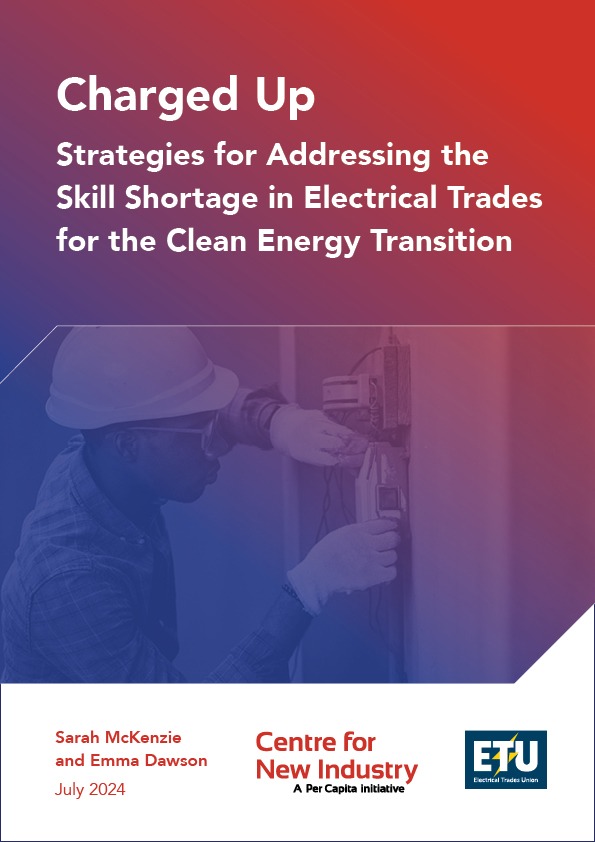
Charged Up: Strategies for Addressing the Skill Shortage in Electrical Trades for the Clean Energy Transition
The Federal Government’s ambitious plan to transform Australia into a Renewable Energy Superpower requires a corresponding ambition to fix critical shortages in the electrical workforce.
Responsible Technology
August 30, 2024
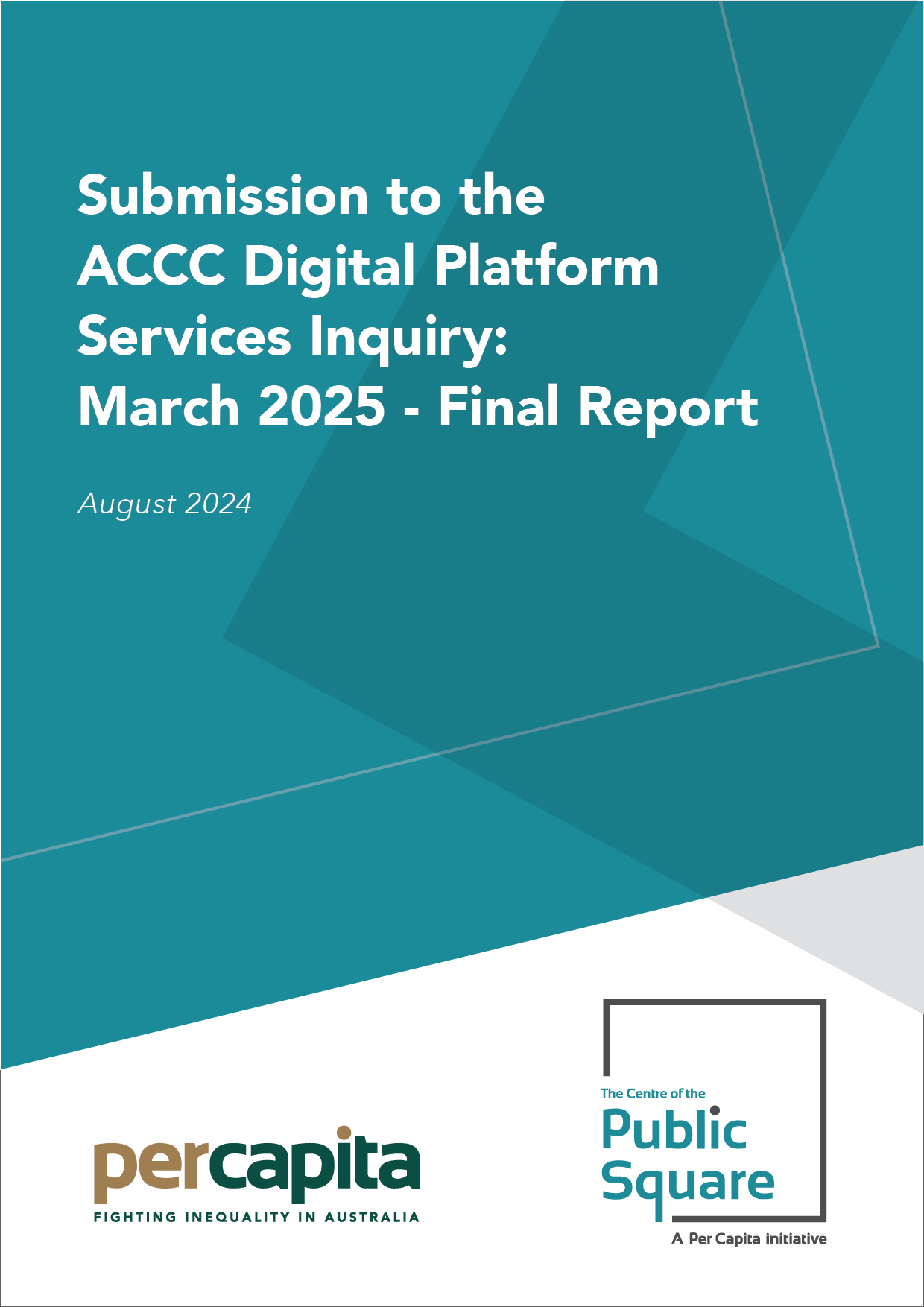
Submission to the ACCC Digital Platforms Services Inquiry – March 2025 – Final Report
The ACCC’s Digital Platform Inquiry (DPI) is a world-leading initiative which looks at addressing the market power and dominance of digital platforms.
Equitable Housing
August 20, 2024

Submission to the Inquiry into the National Housing and Homelessness Plan Bill 2024 (No.2)
This submission details our response to the National Housing and Homelessness Plan Bill 2024 (No.2)
Equitable Housing
July 25, 2024
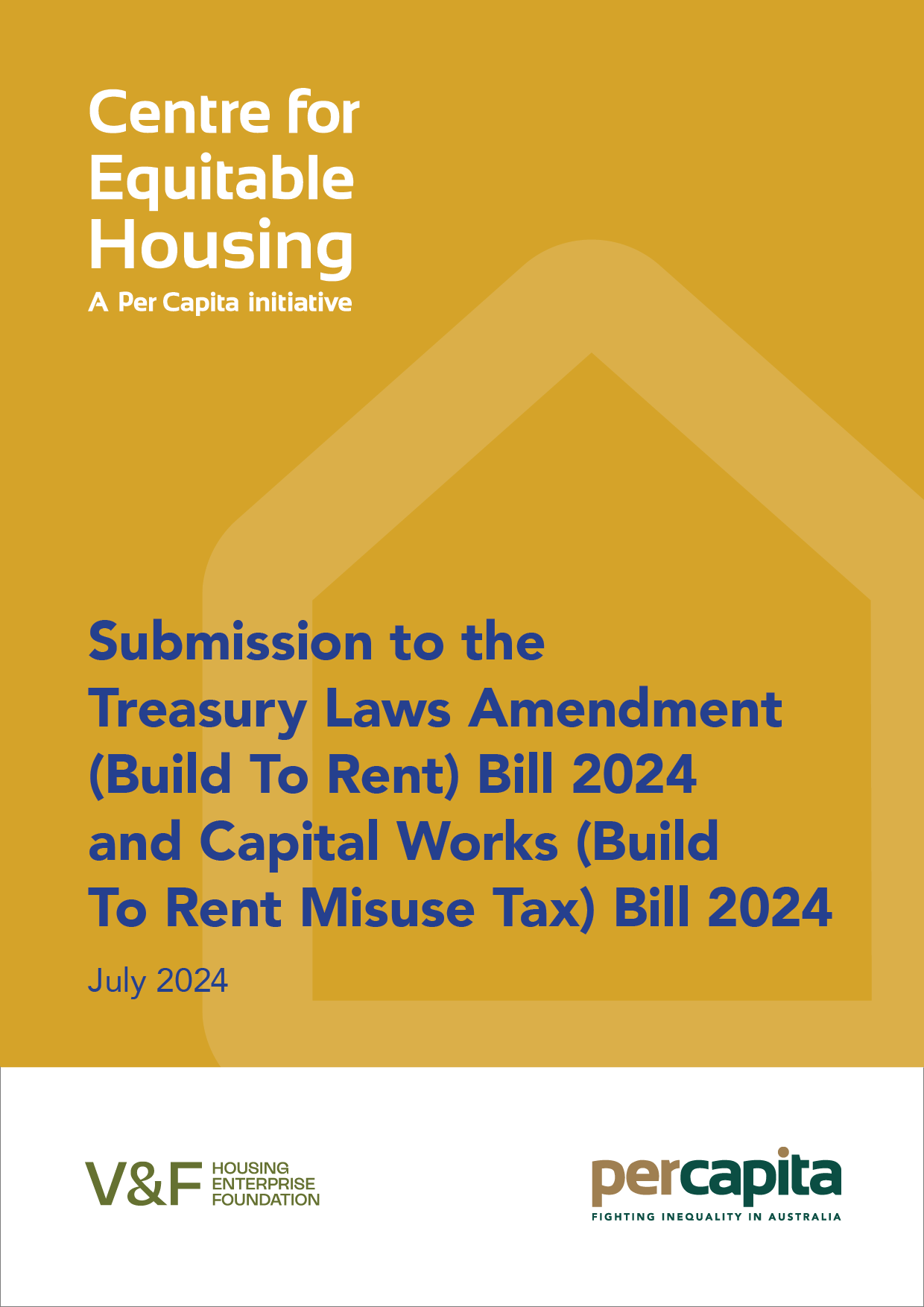
Submission to the Treasury Laws Amendment (Build To Rent) Bill 2024 and Capital Works (Build To Rent Misuse Tax) Bill 2024
In April/May 2024 CEH made a submission to the Treasury’s consultation into the Treasury Laws Amendment Bill 2024 exposure draft. In response to the revised legislation introduced to Parliament in June 2024 we make some additional comments here.
Work and Workers
Gender Equality
October 9, 2024

Submission to the Wage Justice for Early Childhood Education and Care Workers Inquiry
The historical undervaluation of work primarily done by women remains a key driver of this gap and the entrenched inequalities in the labour market today.
Work and Workers
March 27, 2024

A Thousand Hours for Free? Ending Unpaid Placements in Social Work Education
There is a growing body of research highlighting the issues students face in completing degrees in social work.
The requirement to undertake 1000 hours of unpaid field education – equivalent to six months’ full time work – is contributing to a low completion rate despite the demand for social workers increasing.
Work and Workers
October 26, 2023
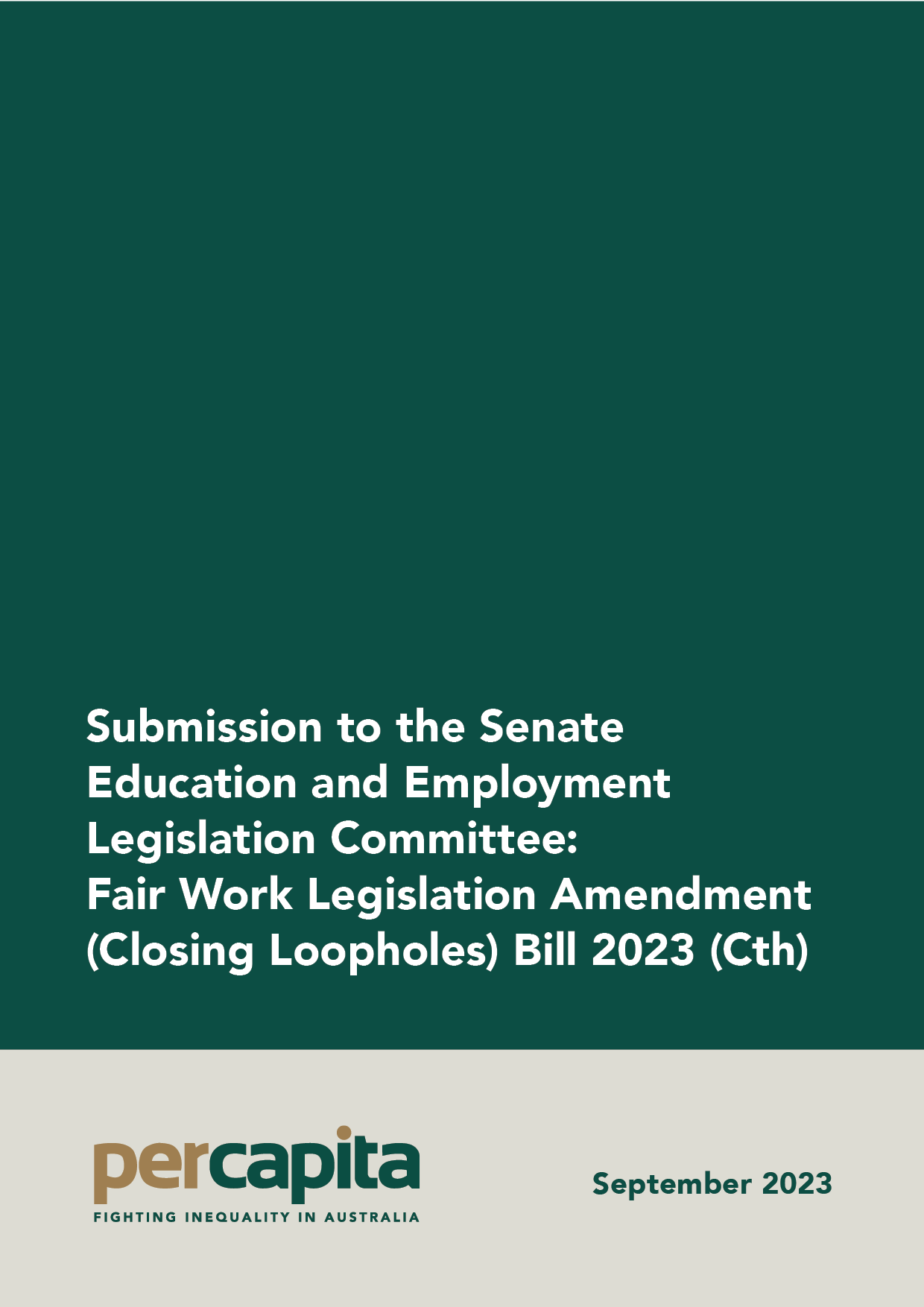
Submission to the Fair Work Legislation Amendment (Closing Loopholes) Inquiry
Key to the Fair Work Act was the inclusion of a fair and comprehensive safety net: a set of minimum employment conditions which cannot be stripped away. Today, too many workers find themselves excluded from this safety net, falling through loopholes in our workplace laws.
Work and Workers
September 18, 2023
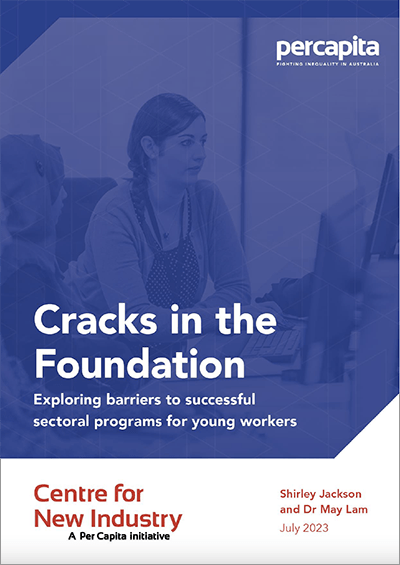
Cracks in the Foundation: Exploring barriers to successful sectoral programs for young workers
The IT industry says yes to sector programs to solve its skills shortages and give young people a go at better quality jobs
Work and Workers
July 27, 2023
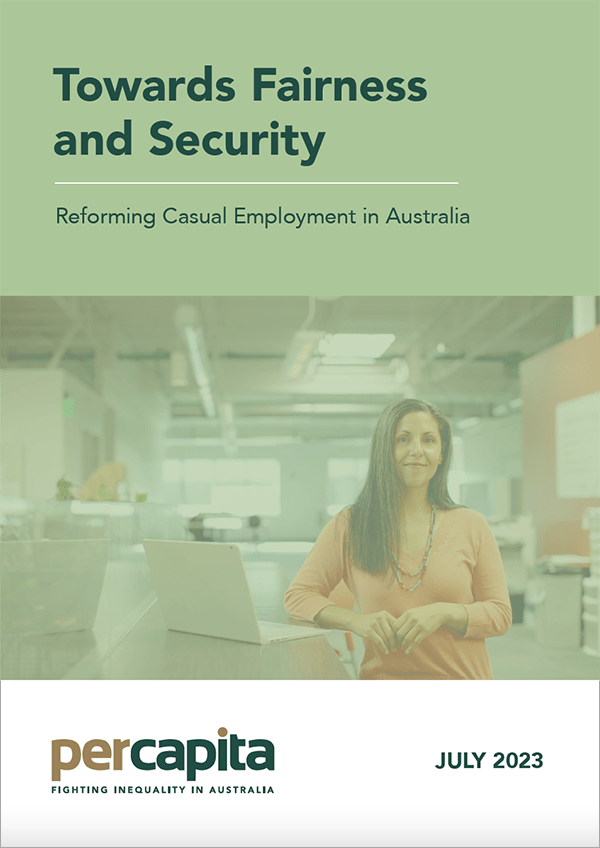
Towards Fairness and Security: Reforming Casual Employment in Australia
Casual employment is meant to be about irregularity, or the absence of a firm advance commitment of continued work. Instead, the real characteristics of casual employment are: low pay, low power, low safety and low security.
Work and Workers
May 26, 2023
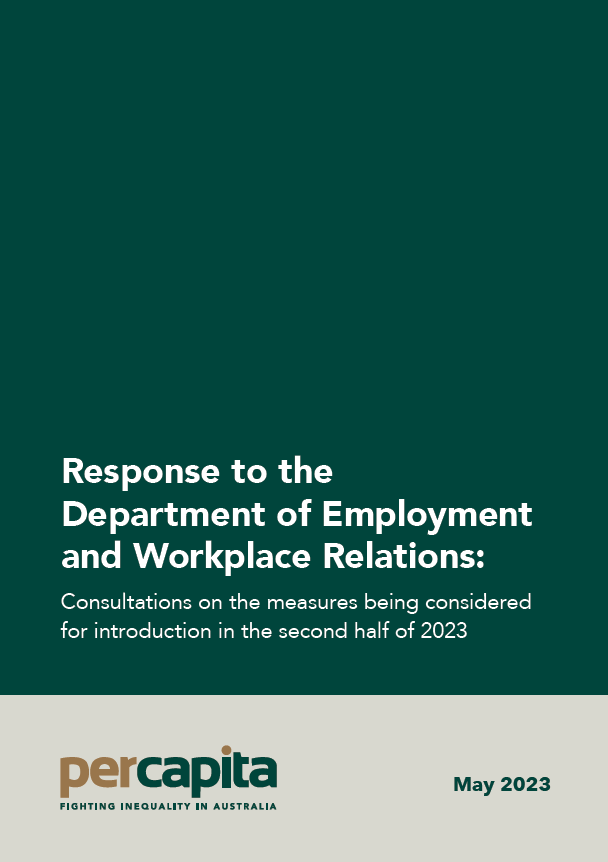
Response to the Department of Employment and Workplace Relations Measures
This submission covers employee-like reforms; casual workers; criminalising wage theft; stronger protections for workers against discrimination, adverse action, and harassment; and the 'Same Job Same Pay' legislation.
Work and Workers
April 29, 2023
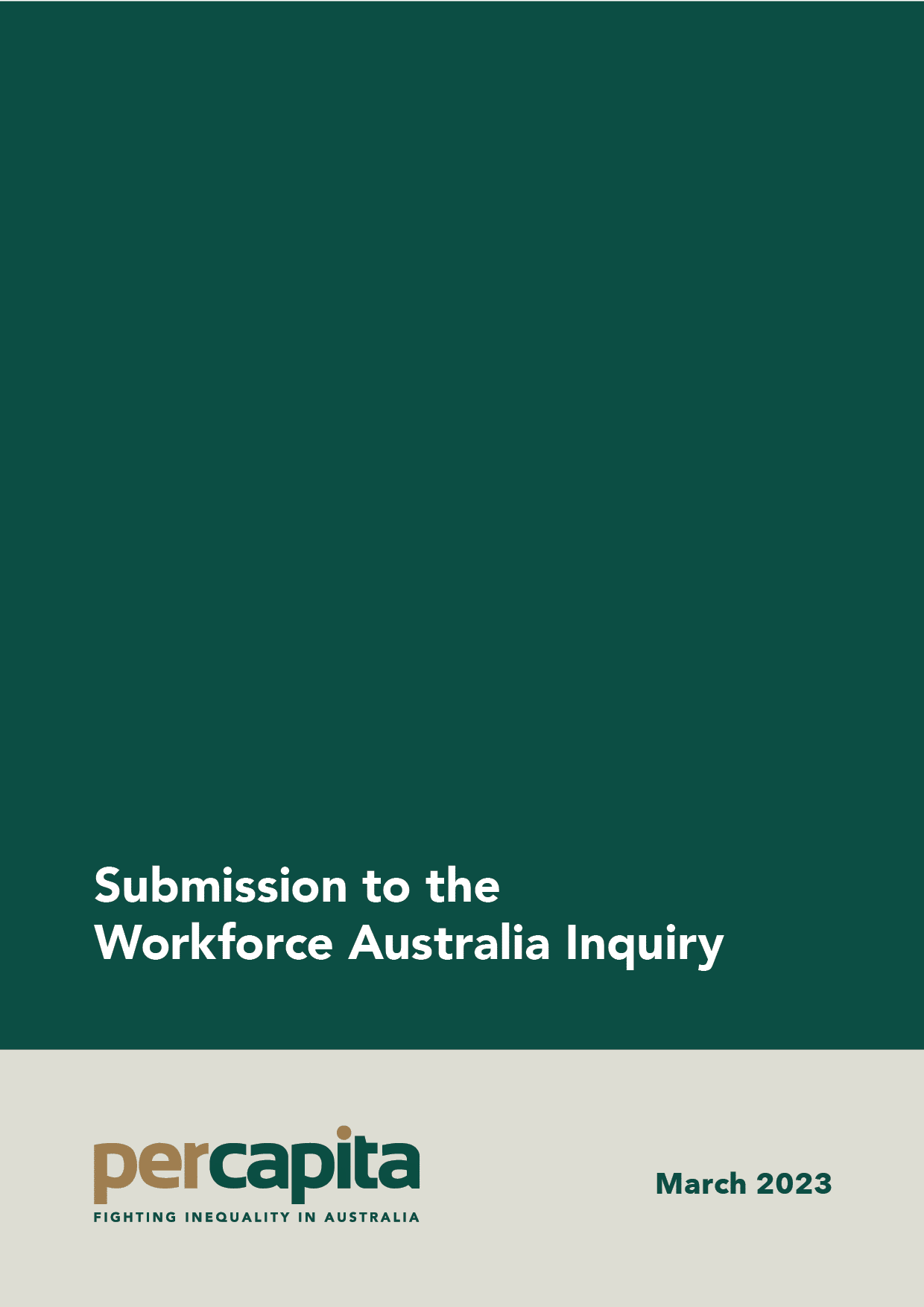
Submission to the Workforce Australia Inquiry
The employment services system is failing. Privatisation, announced with much fanfare 25 years ago, has not delivered on its promises, and substantial change is urgently needed.
Work and Workers
April 27, 2023
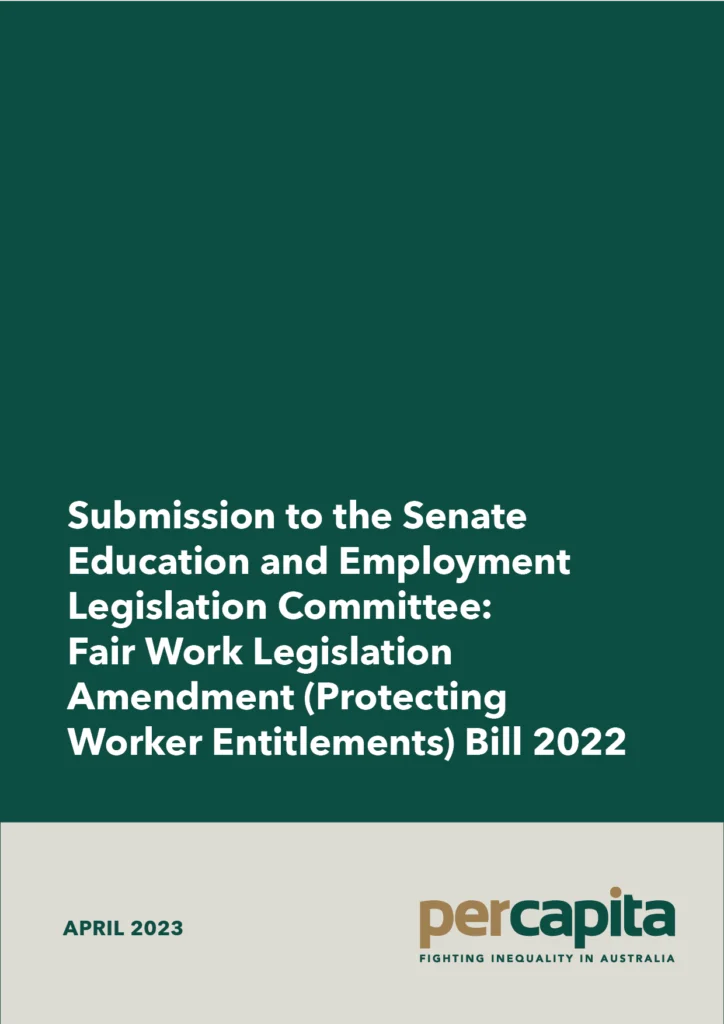
Submission to the Fair Work Legislation Amendment (Protecting Worker Entitlements) Bill 2022
We acknowledge that the Bill is the next step in building a fairer more securing workplace relations system, after years of neglect, and look forward to making further submissions relating to governments agenda of closing the loopholes some businesses use to undercut worker security.
Gender Equality
Gender Equality
October 9, 2024

Submission to the Wage Justice for Early Childhood Education and Care Workers Inquiry
The historical undervaluation of work primarily done by women remains a key driver of this gap and the entrenched inequalities in the labour market today.
Gender Equality
October 5, 2022
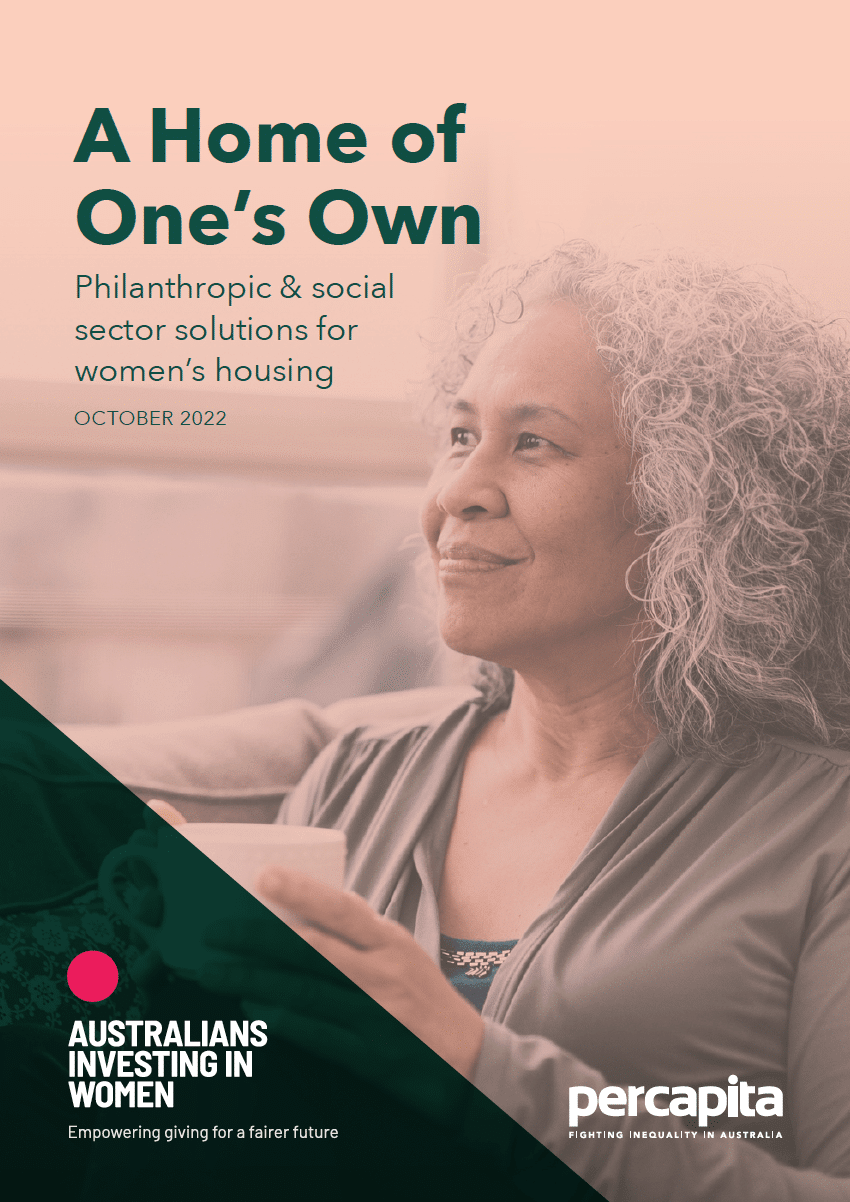
A Home of One’s Own: Philanthropic and social sector solutions for women’s housing
Australia is experiencing a housing crisis, and its impact is highly gendered.
Homepage Feature
September 30, 2022

Submission to the Senate Select Committee Inquiry into Work and Care
Consideration of how we might better balance the demands of paid labour with the needs of our families and loved ones is fundamental to creating a more equitable and just society.
Gender Equality
November 30, 2021
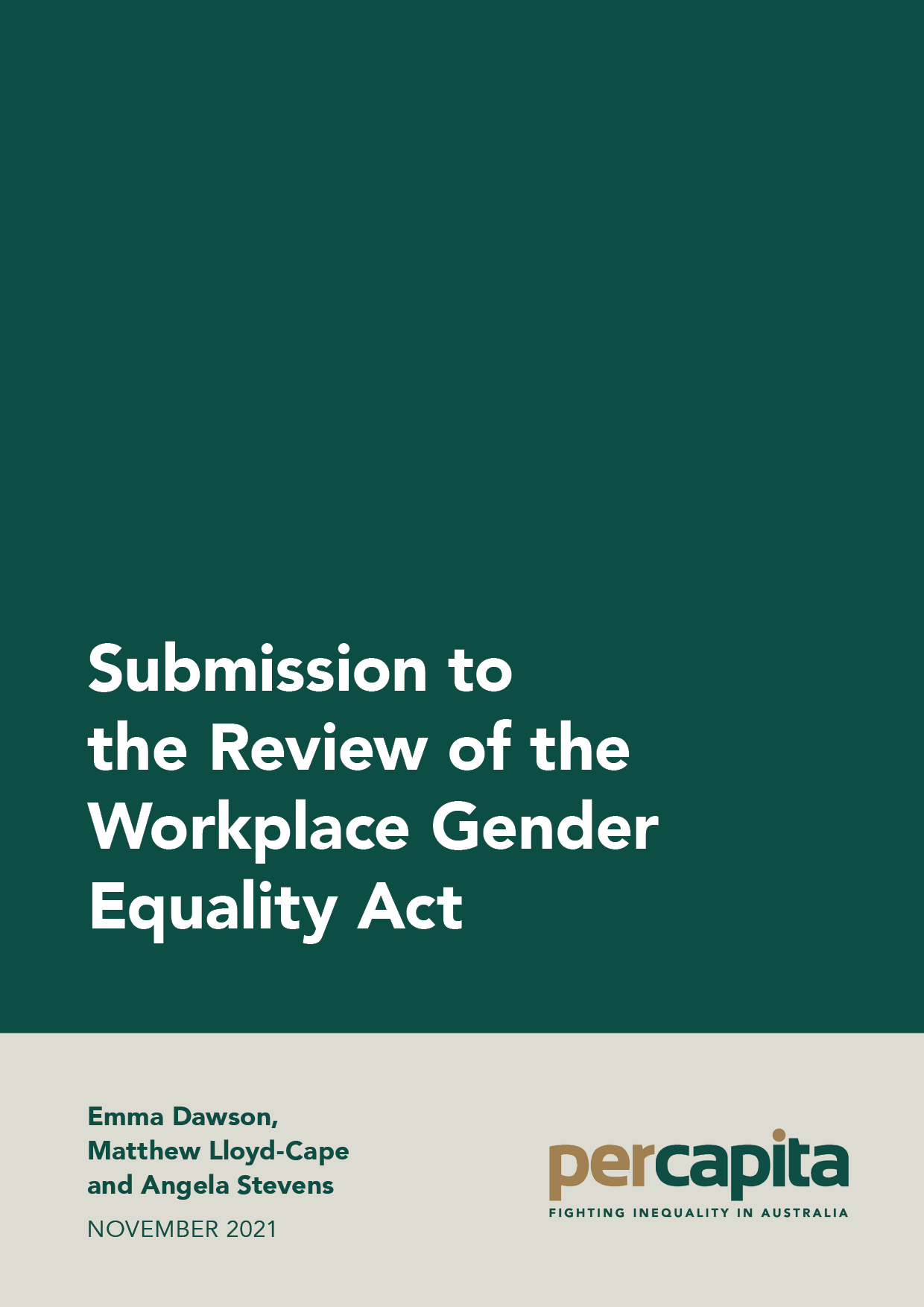
Submission to the Review of the Workplace Gender Equality Act
Per Capita welcomes the opportunity to contribute this submission to the Review of the Workplace Gender Equality Act, 2012 (the Act), which sets the scope of work for the Workplace Gender Equality Agency (WGEA). The Act has not been reviewed since its introduction in 2012, and the public’s understanding of the gender pay gap, and ... Read more
Gender Equality
August 31, 2020

The ‘Herstory’ of Superannuation
This report looks at the history of superannuation for Australian women, marks its progress towards equity, and identifies what more could to be done to improve the system in order to mitigate women’s vulnerability to poverty in retirement.
Gender Equality
March 3, 2020

Measure for Measure: Gender Equality in Australia
Gendered data matters. Regular, transparent reports on performance against an agreed set of indicators are critical if we are to achieve the goal of gender equality. Without accountability, closing the gender gap in Australia and across the globe will remain merely an aspirational goal, rather than an achievable target. This report is intended to provide the foundation for a long-term project to produce a national, comprehensive longitudinal study of the progress towards gender equality in Australia.
Ageing
April 2, 2019
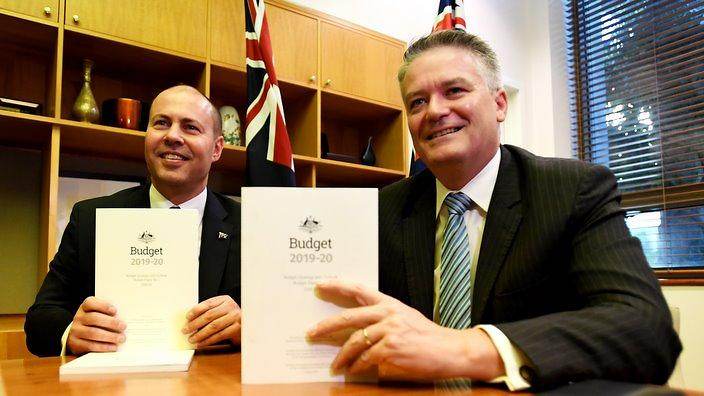
Per Capita’s 2019 Fantasy Budget
Every year, progressive think tank Per Capita releases its fantasy budget: a set of budget priorities that, if implemented, would progress Australia towards a more equal society. Here are our budget priorities this year.
Work and Workers
February 28, 2018

The Future of the Fair Go: Securing Shared Prosperity for Australian Workers
The government must intervene to secure the hard-fought-for right of Australian workers to receive a living wage in return for their labour.
Post Carbon Economy
Post Carbon Economy
September 4, 2024

Charged Up: Strategies for Addressing the Skill Shortage in Electrical Trades for the Clean Energy Transition
The Federal Government’s ambitious plan to transform Australia into a Renewable Energy Superpower requires a corresponding ambition to fix critical shortages in the electrical workforce.
Post Carbon Economy
May 27, 2023

Submission to the Victorian Offshore Wind Transmission Consultation
We believe that these reforms will ensure that offshore wind is sustainable, both ecologically and economically, and will be part of a prosperous future in Portland and Gippsland.
Work and Workers
August 24, 2022
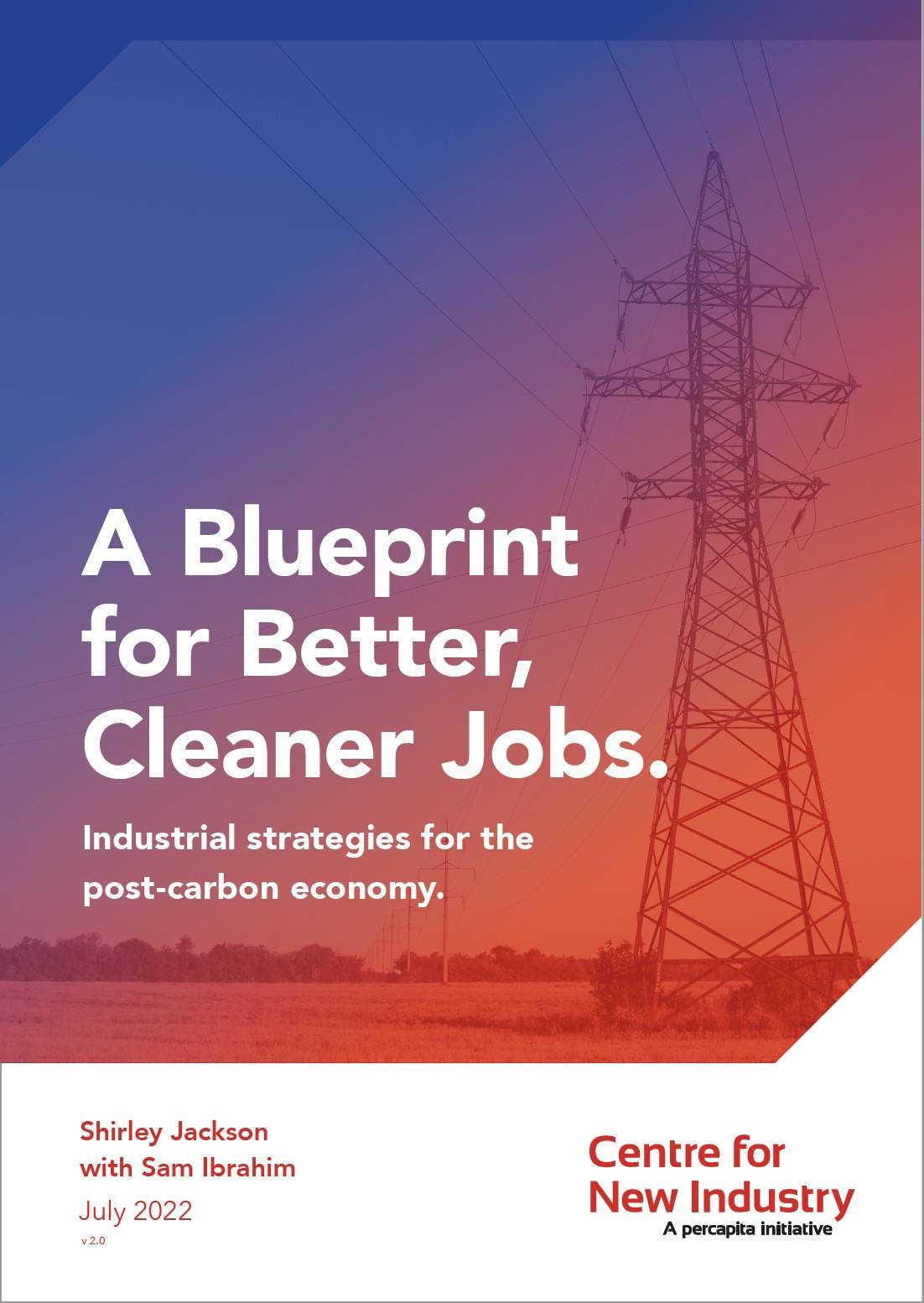
A Blueprint for Better, Cleaner Jobs
The political, ecological and economic challenge of decarbonising Australia’s energy and industrial base is crying out for leadership. The next five to ten years are crucial to ensure that the worst outcomes of the climate crisis are mitigated, and we have a unique opportunity to reframe our economy in the interests of the people who work within it.
Progressive Economics
Progressive Economics
September 25, 2024

Co-operative Employment Economics: Sustaining Employment and Community Prosperity
An exploratory analysis of the impact of Co-operative and Mutual Enterprise (CME) and Equity Owned Firm (EOF) models on employment returns and employment outcomes
Progressive Economics
February 8, 2024
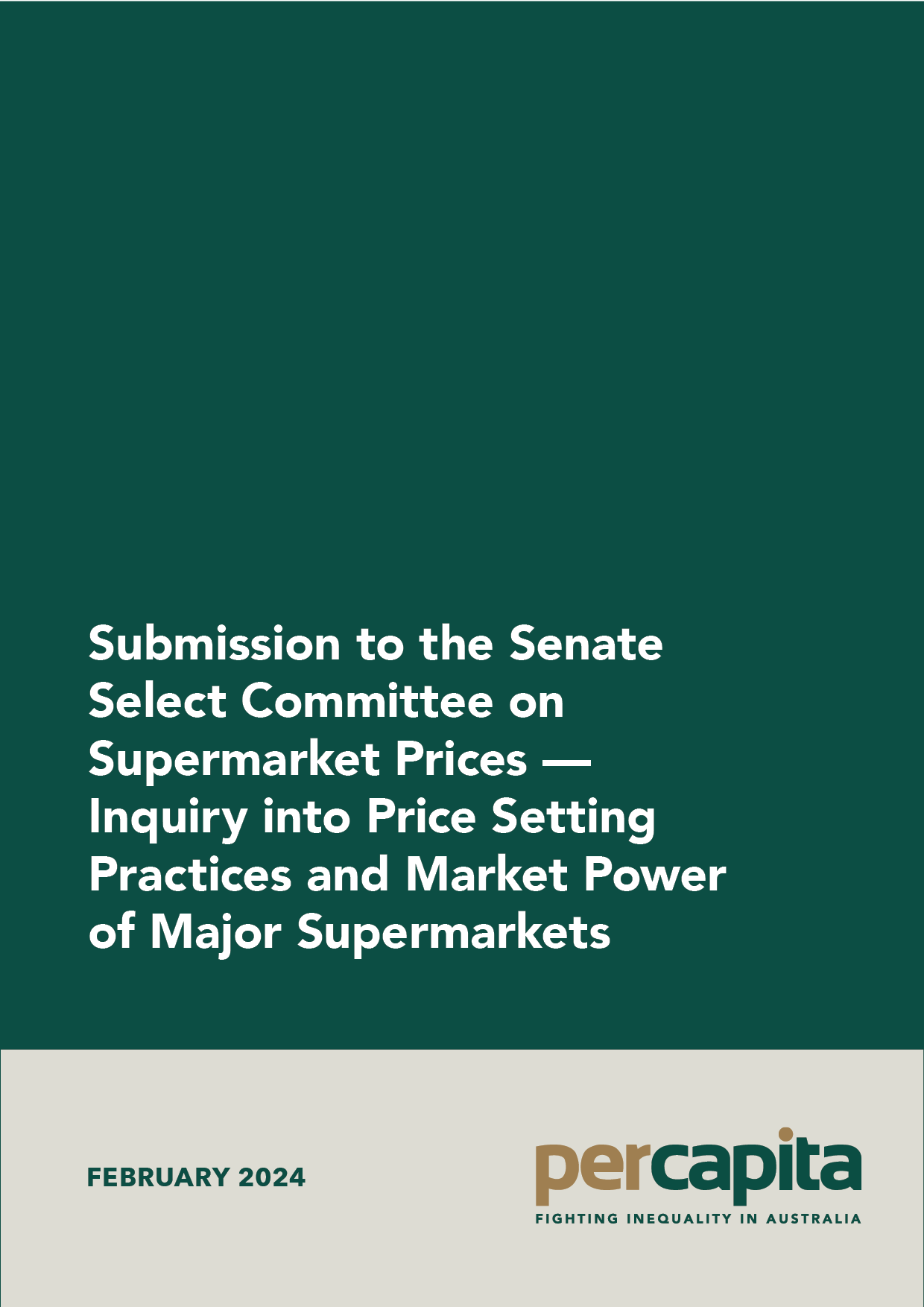
Submission to the Inquiry into Price Setting Practices and Market Power of Major Supermarkets
Our submission discusses how highly concentrated markets, and the substantial market power of Australia’s supermarket duopoly can harm consumers, workers, and fuel inequality. It makes several recommendations for the committee to consider.
Progressive Economics
September 22, 2023
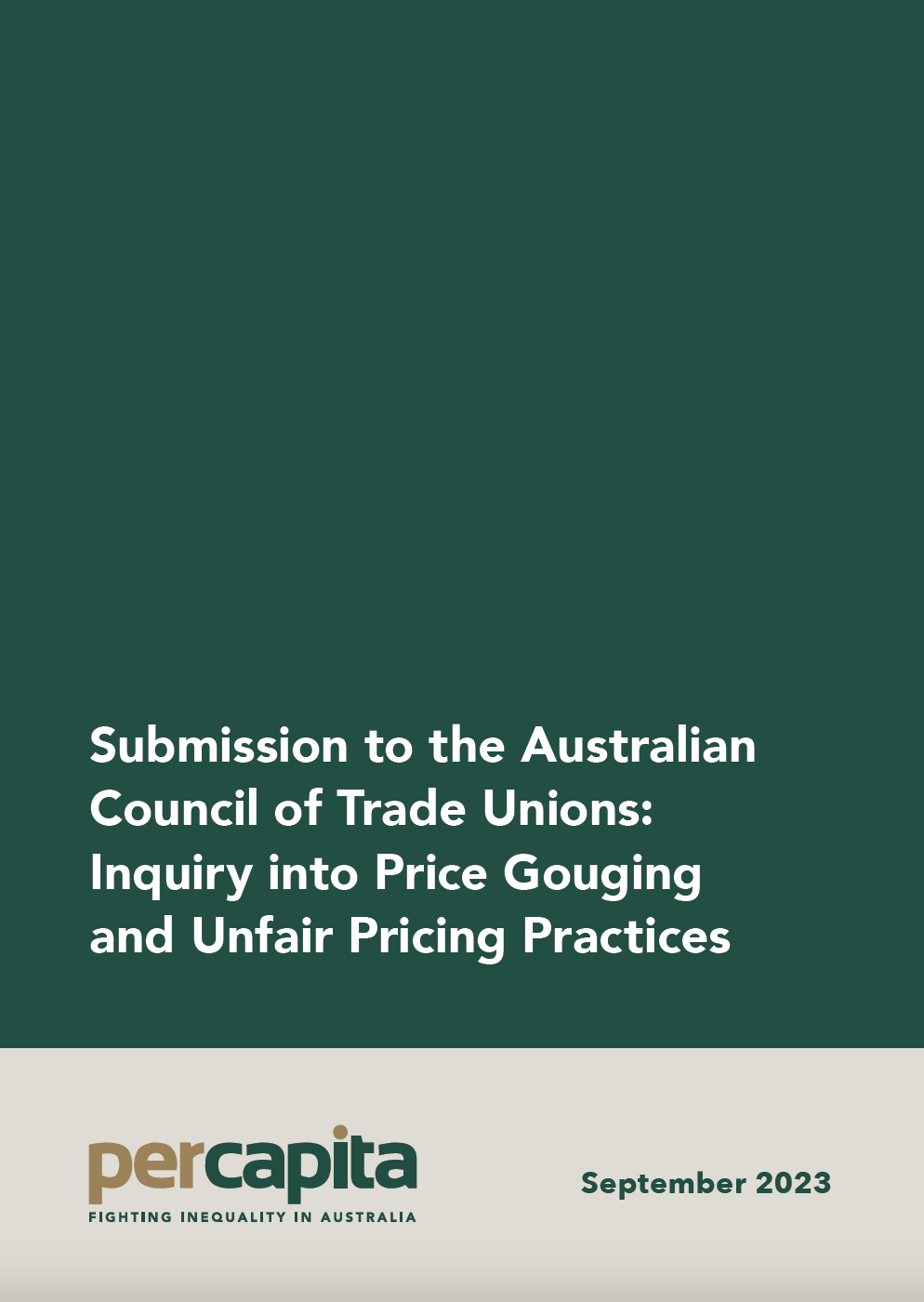
Submission to the ACTU Inquiry into Price Gouging and Unfair Pricing Practices
Our submission discusses how the state of competition in Australian industries can harm consumers and workers, and fuel inequality. It advocates for expeditious reforms to our consumer and industrial law, to empower consumers and workers, and lessen the effect of future shocks.
Progressive Economics
May 28, 2023

The Australian Inequality Index
The Australian Inequality Index is a ground-breaking new tool that provides a multidimensional measure of inequality across a range of economic, social, and demographic indicators.
Progressive Economics
March 30, 2023

Not a One-Stop Shop: The NDIS in Australia’s social infrastructure
Government support to NDIS Tier 2 services was diminished under the previous government, despite calls from the sector, and the Productivity Commission, to return the scheme to its original design.
Progressive Economics
March 27, 2023
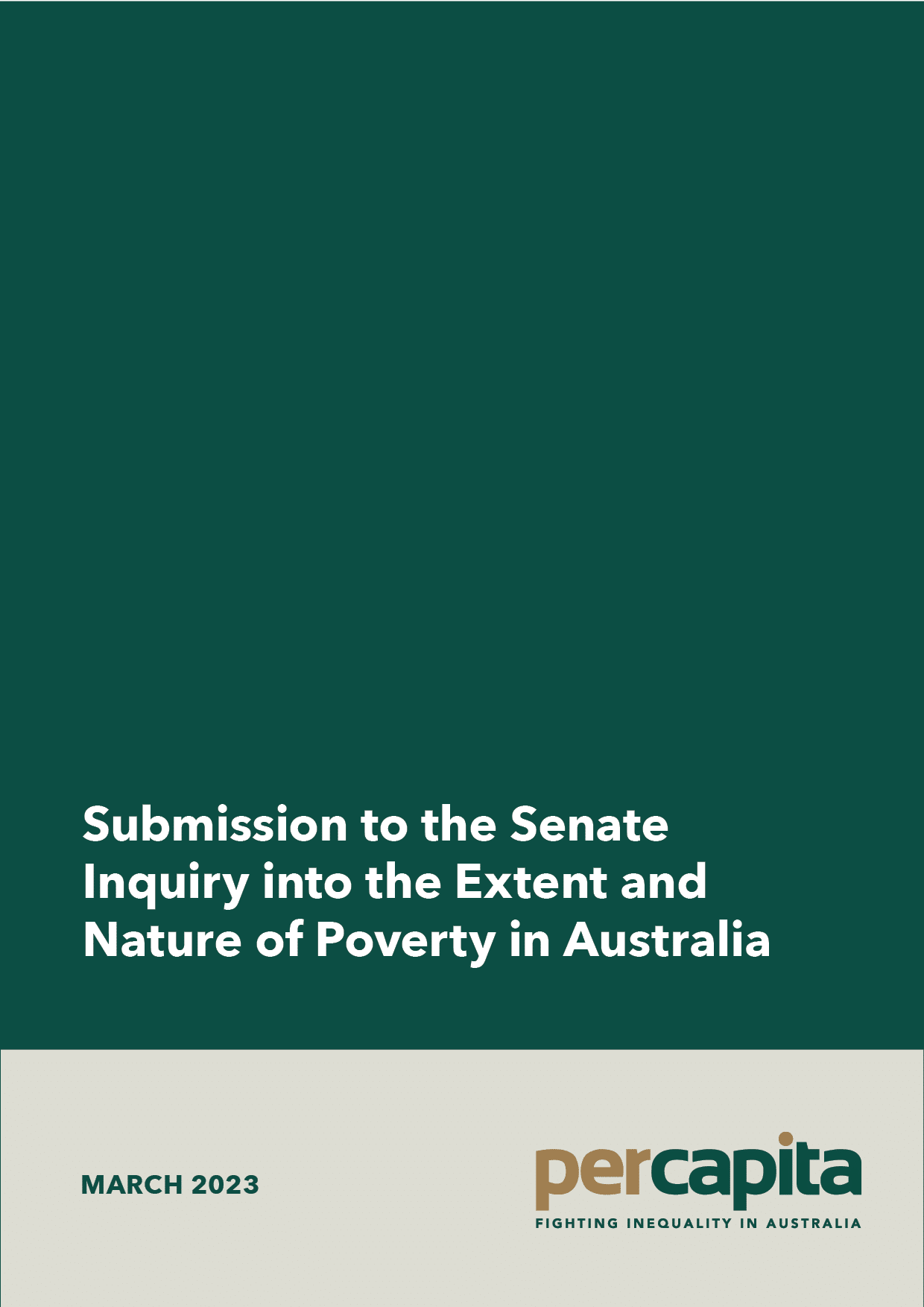
Submission to the Inquiry into the Extent and Nature of Poverty in Australia
Poverty is best understood as neither a personal failing nor as an historical accident. Rather, it is the consequence of power relations, such as those between working people and their employers, or between citizens and the state.
Progressive Economics
March 20, 2023
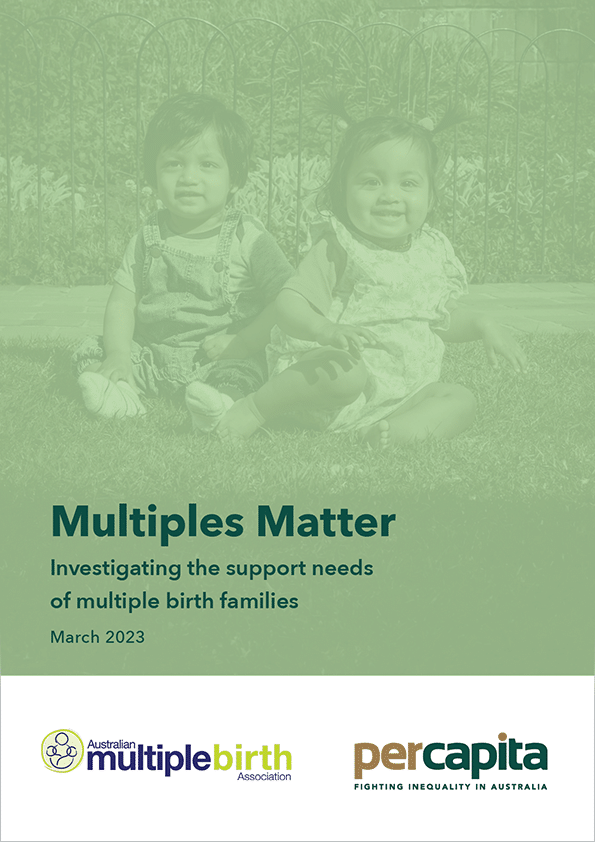
Multiples Matter: Investigating the support needs of multiple birth families
Families with multiples face a greater set of challenges compared to those with singletons.
Progressive Economics
February 13, 2023
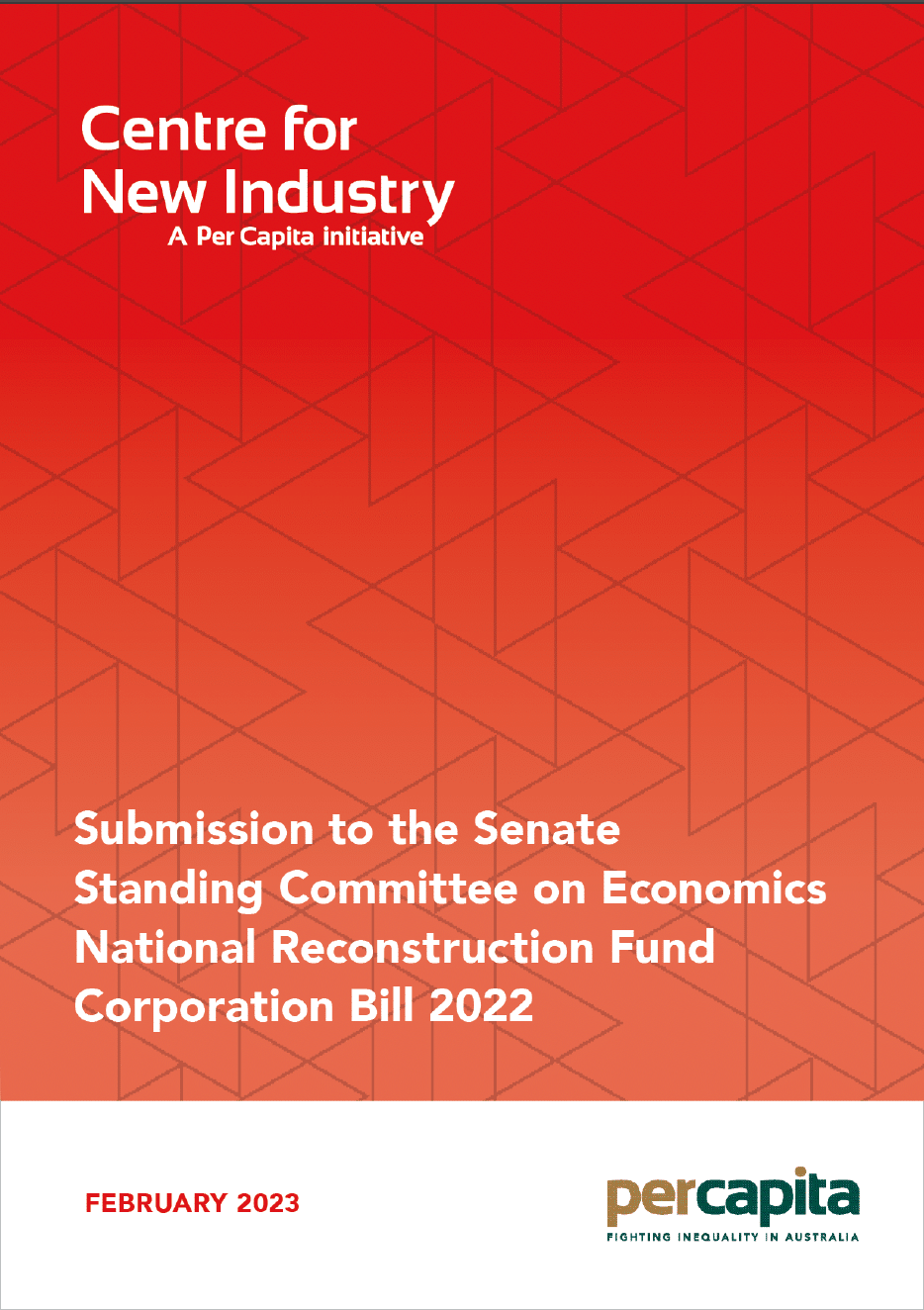
Submission to the Senate Standing Committee on Economics National Reconstruction Fund Corporation Bill 2022
In this submission, The Centre for New Industry (CNI) welcomes the opportunity to make a submission to the Department of Industry, Science and Resources’ consultation on the National Reconstruction Fund (NRF) and argues in favour of the Bill’s passing.
Equitable Housing
Equitable Housing
August 20, 2024

Submission to the Inquiry into the National Housing and Homelessness Plan Bill 2024 (No.2)
This submission details our response to the National Housing and Homelessness Plan Bill 2024 (No.2)
Equitable Housing
July 25, 2024

Submission to the Treasury Laws Amendment (Build To Rent) Bill 2024 and Capital Works (Build To Rent Misuse Tax) Bill 2024
In April/May 2024 CEH made a submission to the Treasury’s consultation into the Treasury Laws Amendment Bill 2024 exposure draft. In response to the revised legislation introduced to Parliament in June 2024 we make some additional comments here.
Equitable Housing
May 27, 2024
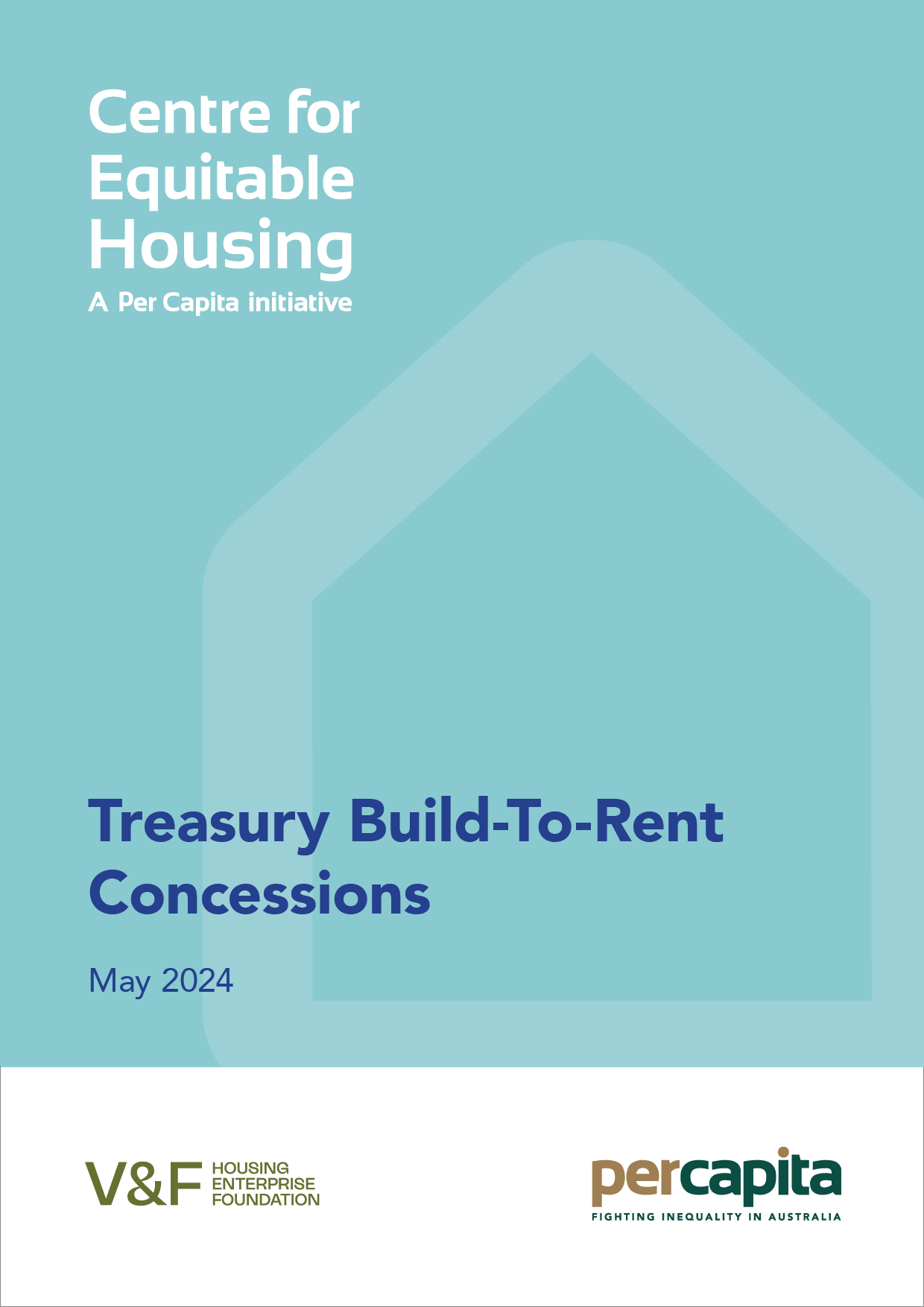
Treasury Build to Rent Concessions Submission
The CEH welcomes the Government’s announcement that investment in the Build-To-Rent sector would be supported through tax concessions.
Equitable Housing
May 27, 2024

Help to Buy Bill 2024 (Qld) Submission
The Help to Buy Scheme gives prospective first home buyers not living in social housing in Queensland the opportunity to access shared equity homeownership.
Equitable Housing
April 15, 2024
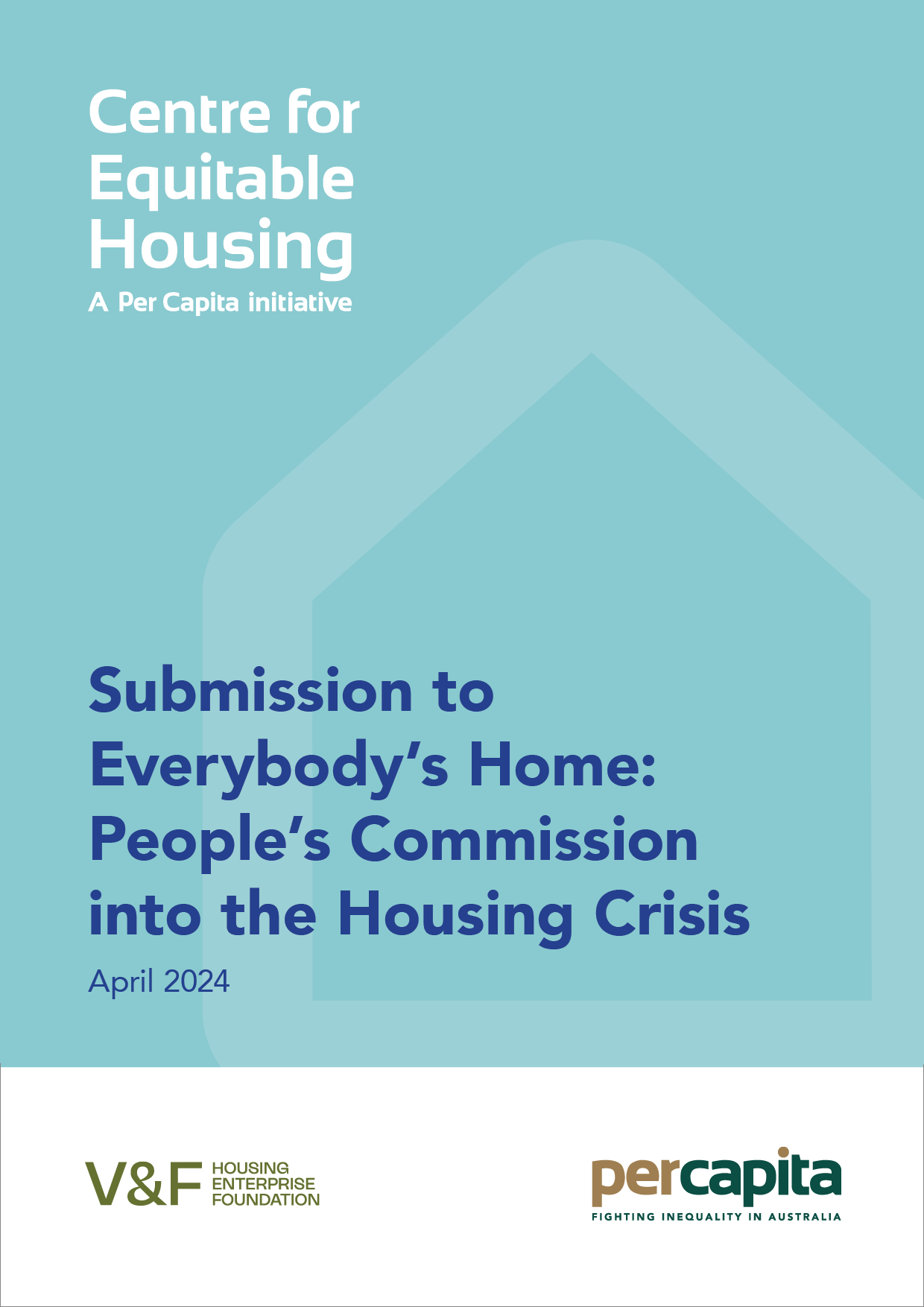
Submission to Everybody’s Home: People’s Commission into the Housing Crisis
In early 2024, Everybody’s Home convened a 'People’s Commission into the Housing Crisis'.
Equitable Housing
January 16, 2024

On Whose Account? Government Spending on Housing
This paper shows the shift away from treating housing policy as a core economic function of the government to a residual element of the welfare system. The absence of a comprehensive federal housing budget means that the distributional impacts of funding allocation and changes in spending on different groups in society remain largely unevaluated.
Equitable Housing
October 31, 2023
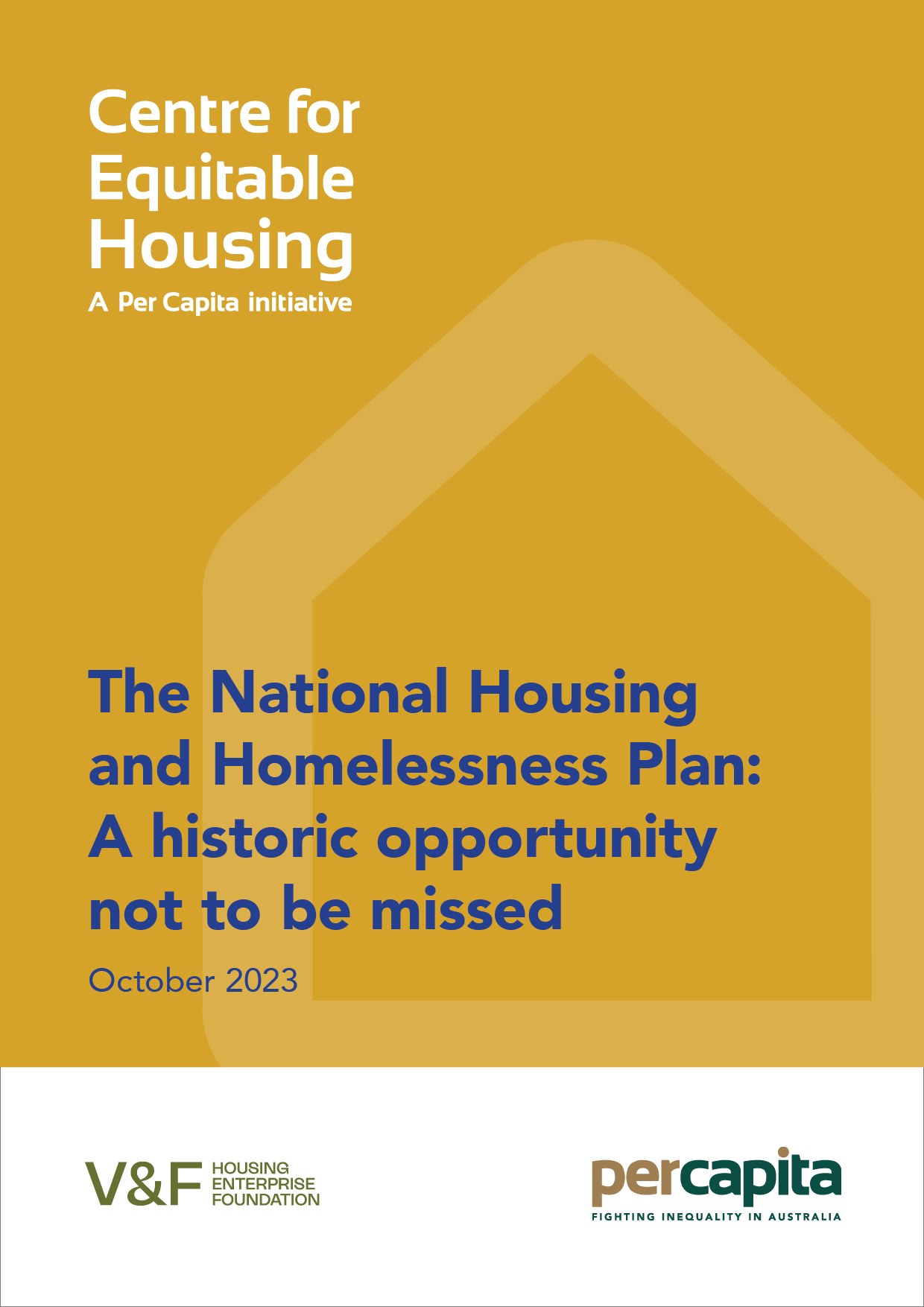
The National Housing and Homelessness Plan: A historic opportunity not to be missed
The development of a new NHHP presents the Federal Government with an historic opportunity to reshape Australia’s broken housing system, to modernise it for the needs of contemporary Australia and to leave a lasting legacy for future generations.
Equitable Housing
August 31, 2023

Light as Air: Regulating Short Term Rentals in Australia
The impact of short-term rental (STR) platforms such as Airbnb has become increasingly problematic, particularly since the end of the COVID-19 lockdowns, as long-term rental dwelling availability has shrunk, and prices increased.
Education
Education
August 25, 2023

Submission to the Inquiry into the Higher Education Support Amendment
Per Capita supports the five priority actions outlined in the Interim Report, as well as the Government’s commitment to implement them all.
Education
February 28, 2023
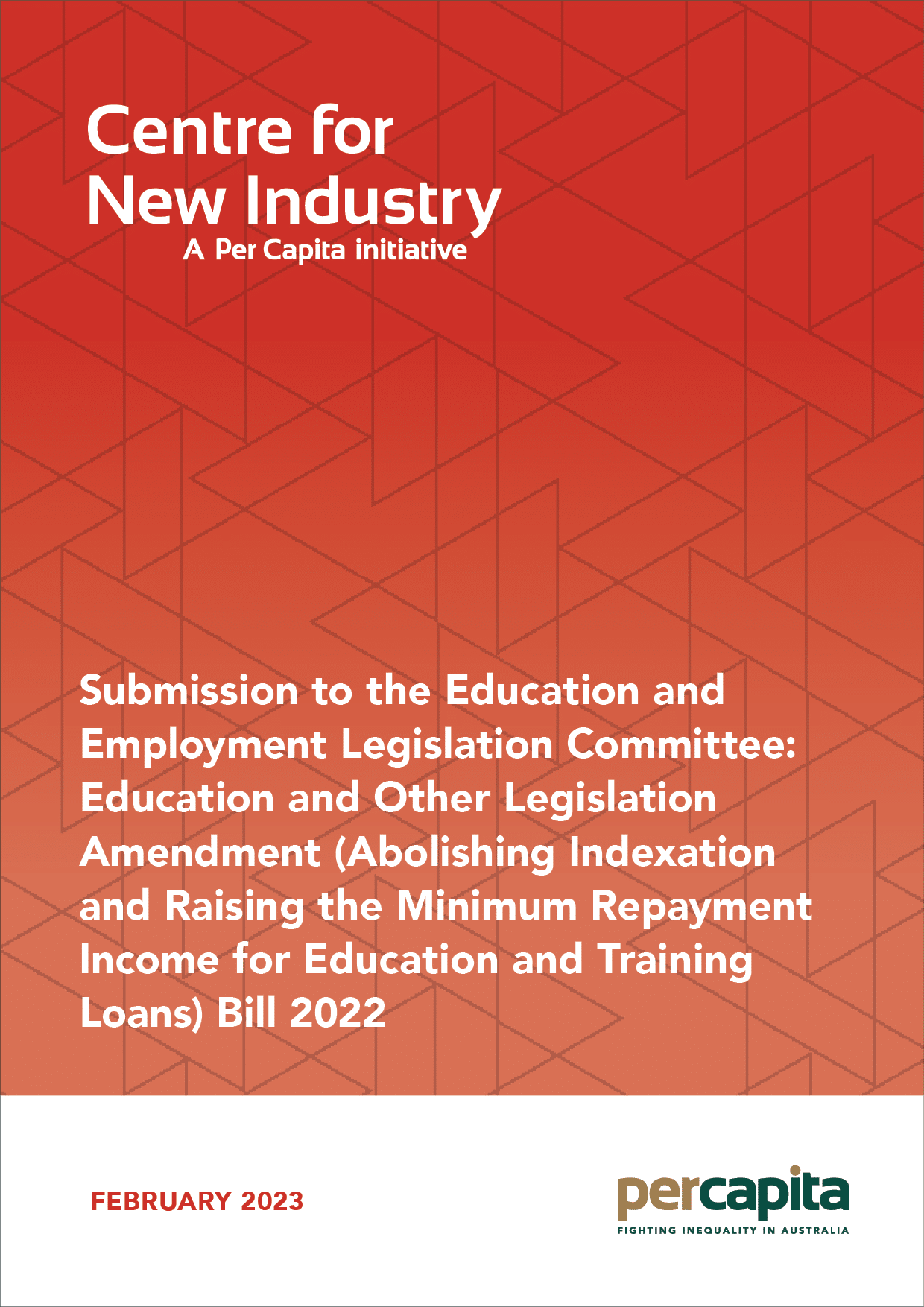
Submission: Abolishing Indexation and Raising the Minimum Repayment Income for Education and Training Loans Bill
In this submission, we argue in favour of the Bill, agreeing with its stated aims of improving the fairness of the funding schemes for post-secondary education and the two proposed solutions, namely to increase the repayment threshold to the median wage and abolish indexation of the loans.
Ageing
April 2, 2019

Per Capita’s 2019 Fantasy Budget
Every year, progressive think tank Per Capita releases its fantasy budget: a set of budget priorities that, if implemented, would progress Australia towards a more equal society. Here are our budget priorities this year.
Education
July 12, 2018

Submission: Inquiry into the Competitive Neutrality of the National Broadcasters
Public broadcasting exists to serve the interests of the public as citizens, not as consumers.
Education
June 4, 2017

Stories to Tell: Protecting Australian Children’s Screen Content
Australian children’s screen content is facing an existential threat as a result of several distinct, but interrelated factors. This paper outlines these challenges and proposes a way forward for the ongoing support of original Australian children’s screen content in the digital age.
Education
March 6, 2014

Who’s Afraid of a Public School? Public Perceptions of Education in Australia
Children's education has become the new topic du jour in Australia. This report measures and explores the attitudes of Australians towards public education. By Verity Firth and Rebecca Huntley.
Education
October 21, 2013

Social Innovation, Public Good: New Approaches to Public Sector Productivity
How does one 'price' a well-educated child or a rapidly cured patient? This report argues that that we should look to the not-for-profit sector to measure social return on investment. By David Hetherington.
Education
July 21, 2013

Training Days: Models of Vocational Training Provision: Lessons from the Victorian Experience
Per Capita evaluates the experience of contestability in vocational training in Victoria. By David Hetherington.
Ageing
Gender Equality
August 31, 2020

The ‘Herstory’ of Superannuation
This report looks at the history of superannuation for Australian women, marks its progress towards equity, and identifies what more could to be done to improve the system in order to mitigate women’s vulnerability to poverty in retirement.
Ageing
July 13, 2020
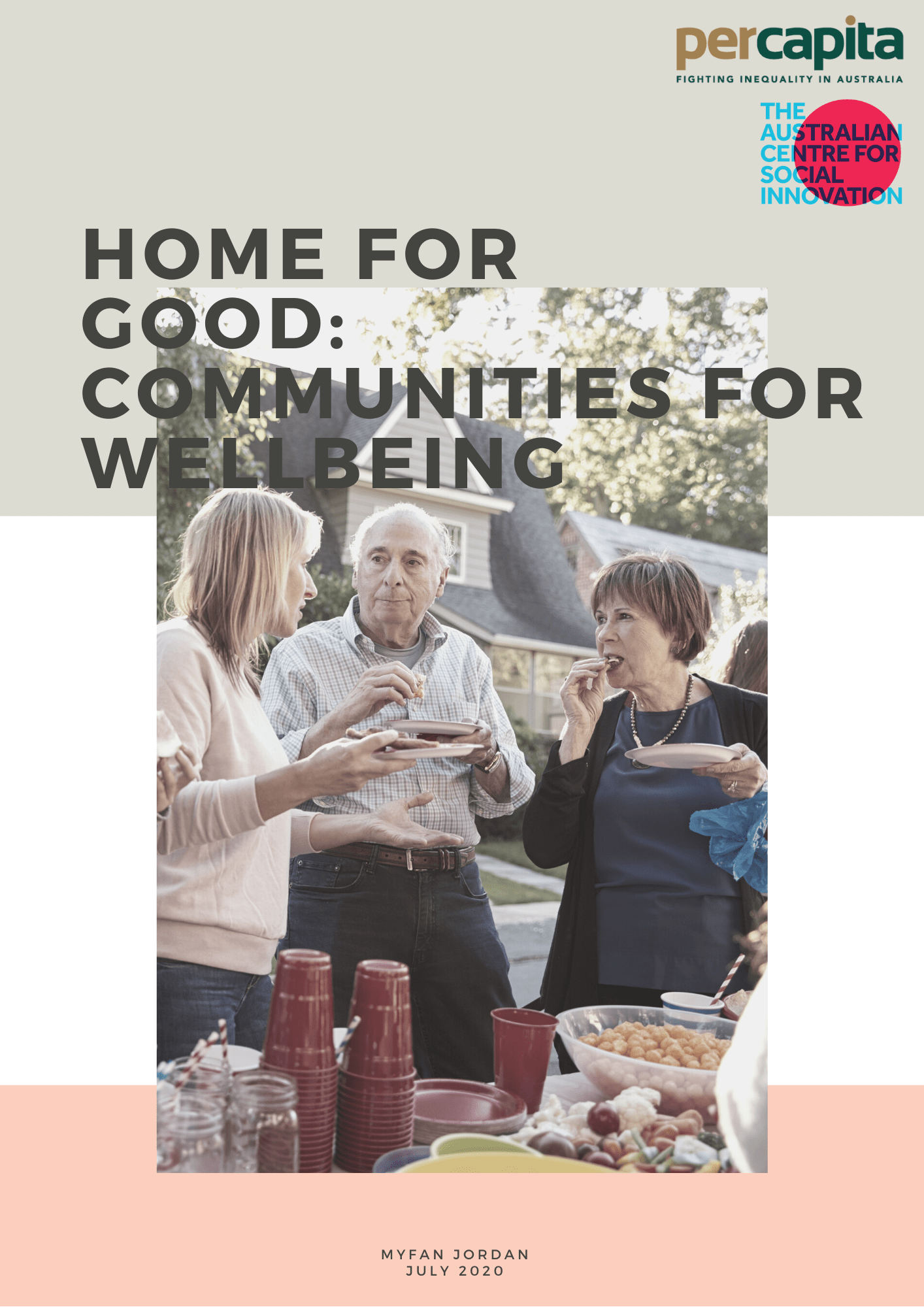
Home for Good: Communities for Wellbeing
In this fourth Home for Good policy brief, we explore ways to build ‘communities for wellbeing’. By this, we mean the ways in which good housing outcomes extend beyond individual housing circumstances to the context of neighbourhood and broader community.
Ageing
May 6, 2020
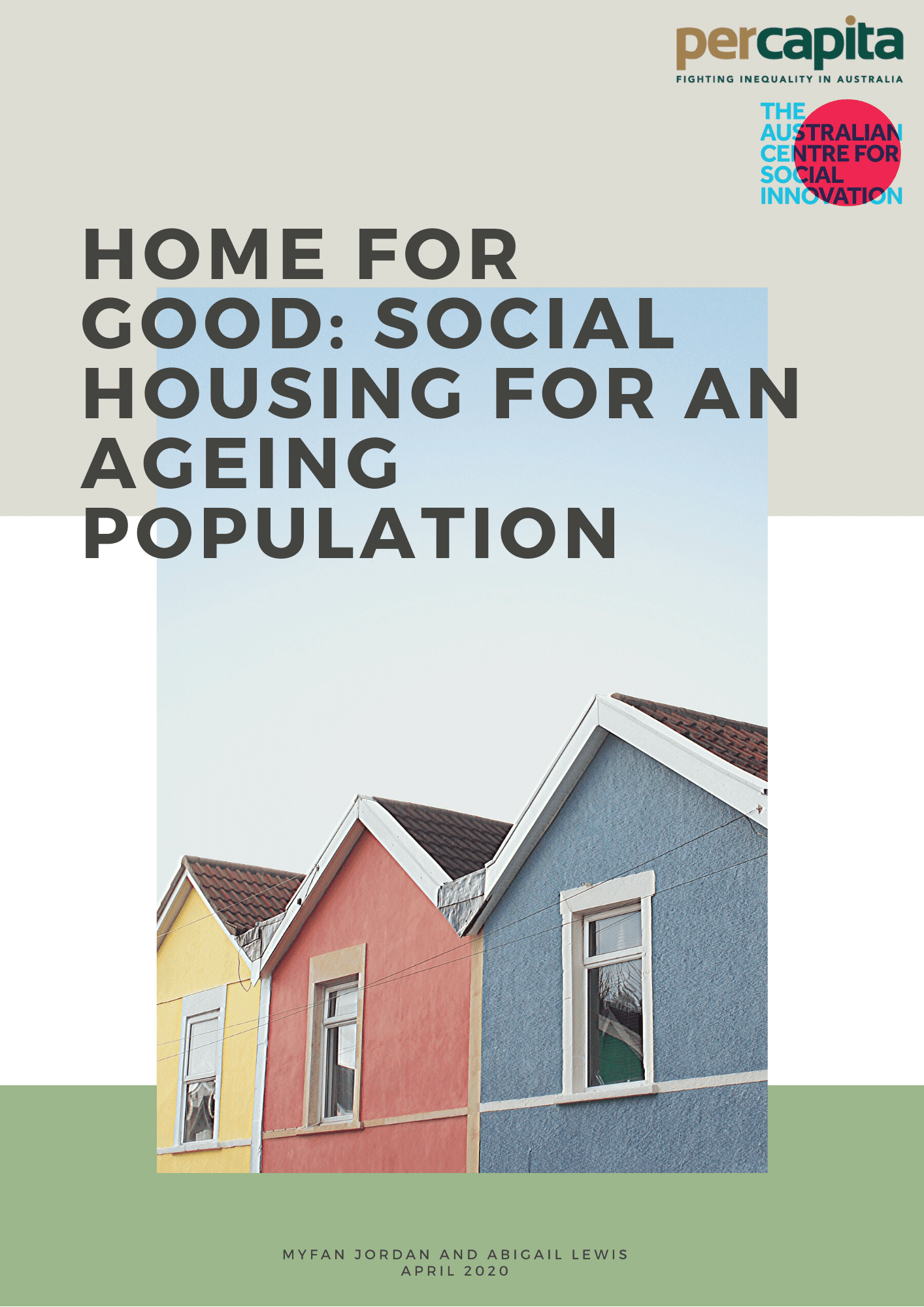
Home for Good: Social Housing for an Ageing Population
In this, our third policy brief, we turn our attention to Australia’s social housing sector. In the context of declining home ownership and growing housing insecurity among older Australians, we ask whether social housing can provide the three critical functions of home as we age.
Ageing
March 23, 2020
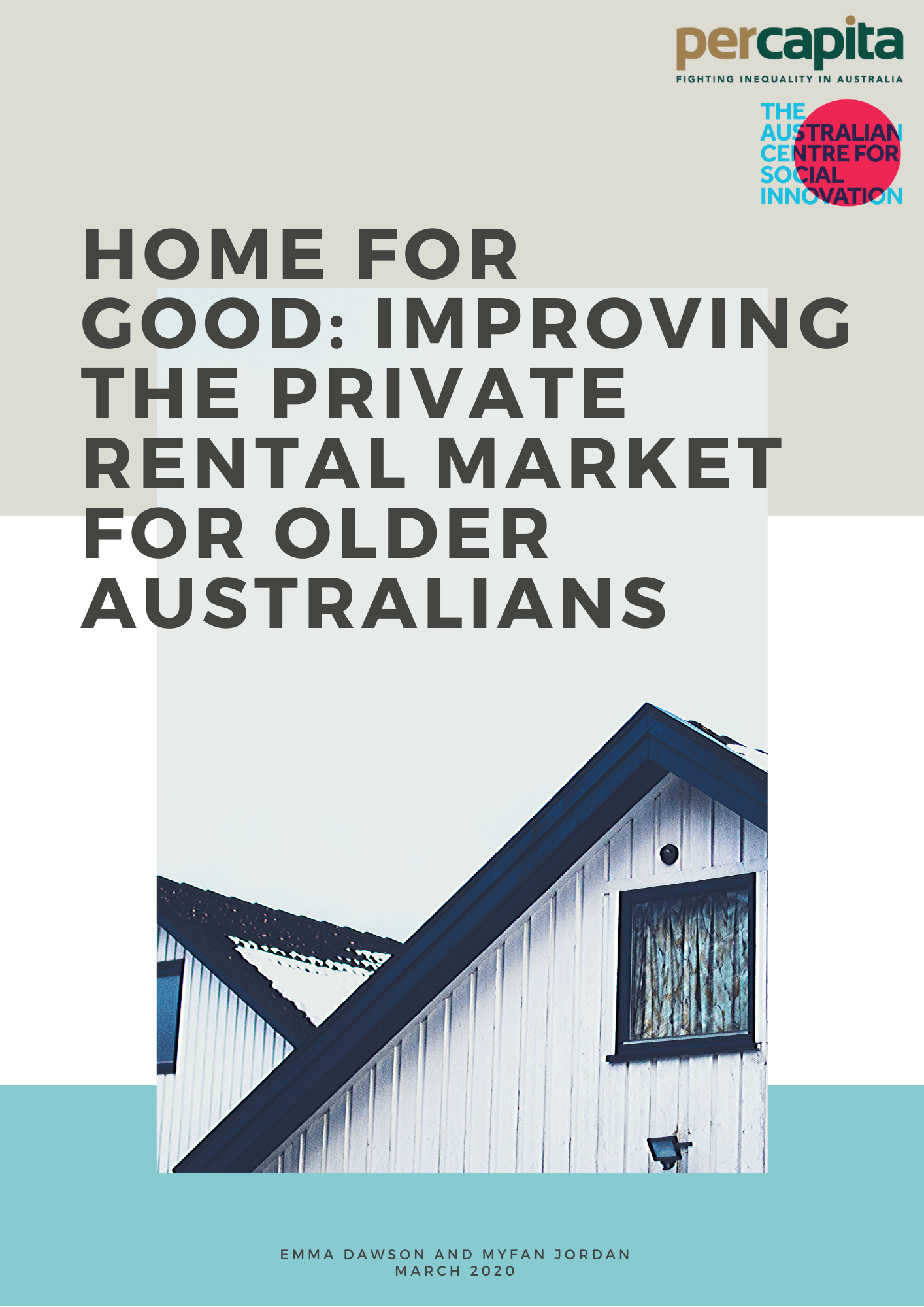
Home for Good: Improving the Private Rental Market for Older Australians
This policy brief, the second in a series looking at housing options for an ageing population, draws on the work of Per Capita and TACSI, to explore and propose new and innovative pathways for private rental housing.
Ageing
February 25, 2020

Home for Good
This policy brief is intended to restore the idea of home as both a psychological and social asset to our discourse on housing, rather than just a financial asset. It is specifically concerned with the role of the home as we age, positing that successful ageing is dependent on a person’s access to a home that provides security, community, safety and autonomy.
Ageing
September 9, 2019
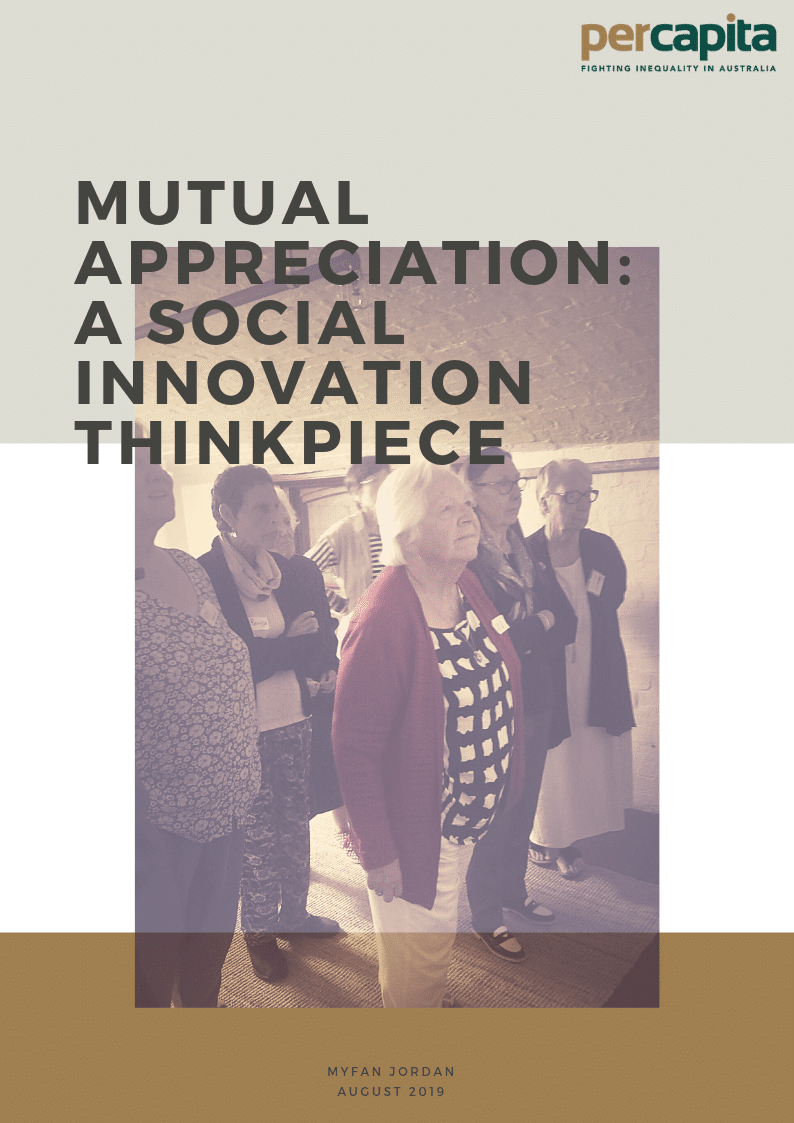
Mutual Appreciation: a social innovation thinkpiece
A triple threat is looming in relation to ageing in Australia, one with particular implications for women. While access to secure and affordable housing can mean the difference between poverty and a decent life in older age, full homeownership in Australia is increasingly a privilege.
Ageing
April 2, 2019

Per Capita’s 2019 Fantasy Budget
Every year, progressive think tank Per Capita releases its fantasy budget: a set of budget priorities that, if implemented, would progress Australia towards a more equal society. Here are our budget priorities this year.
Ageing
May 3, 2018
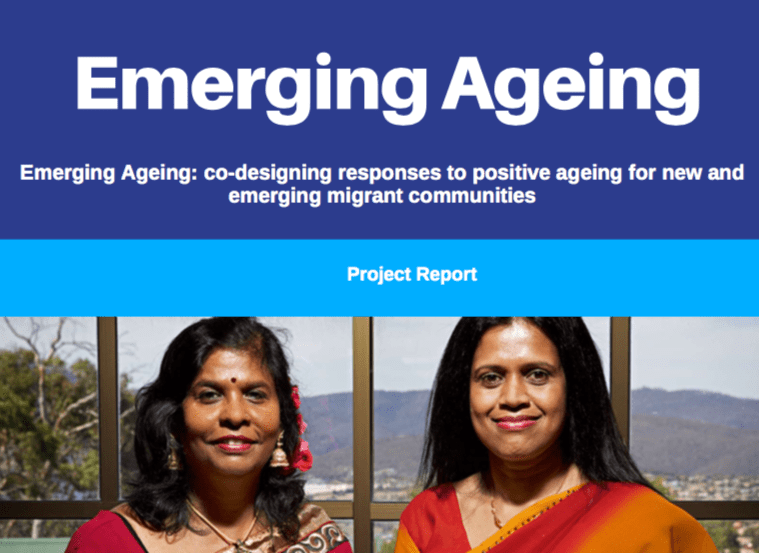
Emerging Ageing: Co-designing Responses to Positive Ageing for New and Emerging Migrant Communities
Emerging Ageing: co-designing responses to positive ageing for new and emerging migrant communities. A report by Per Capita's Centre for Applied Policy in Positive Ageing, in partnership with the Ethnic Communities' Council of Victoria.

Social Innovation
Distress Amplification: Robodebt notices and the intensification of distress in the unemployed
We have to do more: Examining School Leader Perspectives on Hygiene Poverty within Australian Schools
Australia’s Science and Research Priorities: Conversation Starter
Submission to the Inquiry into the National Cultural Policy
Multiples Matter: Investigating the support needs of multiple birth families
False Economy: The economic benefits of the NDIS and the consequences of government cost-cutting
Submission to the Inquiry into Media Diversity in Australia
Per Capita Submission to the Ten-Year Social and Affordable Housing Strategy for Victoria